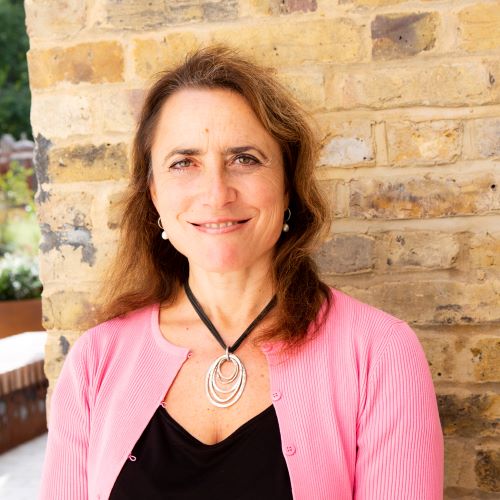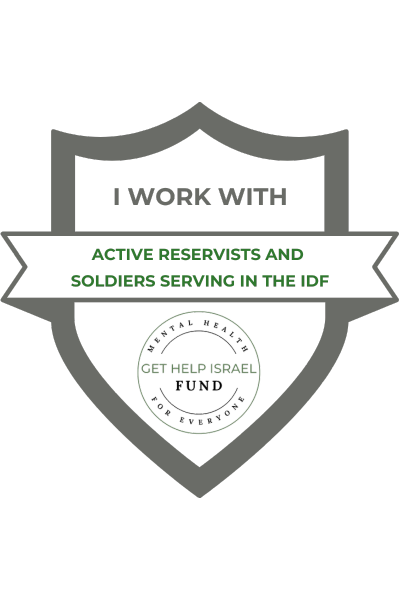Monika Smolar
Credentials
Finances
- Tel Aviv
- Tel Aviv and Online throughout Israel
- Email Me
- FREE CONSULTATION
-
 Business HoursEveningsFridays/Weekends
Business HoursEveningsFridays/Weekends
Monika Smolar
 Verified
Verified
Credentials
Psychotherapist
MA
Finances
350-500 NIS
N/A
Special Rate for New Olim | Sliding Scale | Free Consultation | Student Discount
ABOUT THE THERAPIST
Hello,
Its not easy to choose a psychotherapist so take your time.
At times we all need to talk to someone who is independent and outside of our situation; someone who is non-judgemental, confidential and listens to us empathetically. We might need to take some space, reflect on and work through issues we might be having with partners, family or friends.
Sometimes unresolved memories, traumas or difficulties haunt and trouble us. Maybe we're struggling with some unwanted or outdated behavioural patterns, habits or addictions.
We're only human and taking some time to talk through and explore our triggers and issues can be helpful and healing. Taking the time to focus on our own needs can be very therapeutic. Therapy is an important investment in our present and future mental health and well-being.
I'm an integrative psychotherapist. That means that I combine and integrate different therapeutic approaches eg CBT, psychodynamic, EMDR, person-centred, existential, compassion-focused therapy. I practice in a trauma-informed way and have extensive experience working with trauma and PTSD.
I often use EMDR as it can be highly effective and efficient in lowering our distress and anxiety levels.
EMDR can greatly help with every type of anxiety, low mood/ depression, low self-esteem, grief and any type of traumatic experience from our past of present.
The sessions are focused on you and what you need and want and what might be most helpful for you. You, the client, are always at the centre of any therapy I do.
I may guide you, provide you with helpful tools, techniques and strategies if that is what you need and want. I am there for you.
This is a space where you will be heard and together we will work out what you need and want.
I have worked as a psychotherapist for over 25 years. I have worked with trauma, depression, anxiety, grief and bereavement as well as relationship and family issues and many other problems and concerns. I have worked with trauma and PTSD for many years and practice EMDR which can be very effective in helping with PTSD as well as many other issues. I remain passionate about my work and I've seen the transformation it can bring to people's lives.
I have worked with many different clients groups and in many different settings over that time; Rape Crisis, Domestic abuse, in schools, at a therapeutic community as well as a community mental health clinic and at a university (the LSE) for over twenty years.
I have had a private practice for many years where I see both young and older adults as well as adolescents, couples and provide parental consultations. I work online on Zoom and in person.
I offer long-term and short-term therapy. Sometimes we might agree to see each other for six to eight sessions and then review, or you might want long-term, open-ended therapy.
I mainly work online, on zoom, at the moment. I can also work on the telephone.
I have appointments available during the day; morning and afternoon as well as in the evenings and sometimes on Friday mornings.
I have also run a variety of therapeutic and psycho-educational groups and workshops for many years including Bereavement Groups, Self-Esteem Groups, Stress and Anxiety Management Groups and workshops in Perfectionism, Procrastination and Good Self-Care.
I also offer a fast and effective type of therapy called EMDR (Eye Movement Desensitisation and Reprocessing) therapy.
I have lived and worked in different countries (Poland, Sweden, England, France, Israel) and speak fluent English and Polish. I have a basic knowledge of Swedish, French and Hebrew.
I wish you all the very best finding a psychotherapist.
Monika
QUALIFICATIONS
MA
The School of Psychotherapy and Counselling at Regents College
1995
Degree
MAEducation
The School of Psychotherapy and Counselling at Regents CollegeYear of Graduation
1995Years in Practice
30
ADDITIONAL CREDENTIALS
Certificate in Play Therapy - 2019
EMDR Practitioner Qualification 2021-2022
Certificate in Systemic Family Therapy 2004
Diploma in working with adolescents - 2018
DISTANCE COUNSELING
Telephone Counseling, Online Therapy
PRIMARY SPECIALTIES
Abuse
Anxiety / Panic
Executive / Career / Life Coaching
Trauma / Post Traumatic Stress Disorder PTSD
ADDITIONAL SPECIALTIES
Anger Management
Cancer / Terminal Illness
Depression
Domestic Violence
Eating Disorders
Family Issues
Grief
Life Transitions
Parenting Issues / Training
Self-Esteem
Sexual Abuse / Rape
Stress Management
CLIENT FOCUS
Population
Adolescents
Adults
Couples
Men
Women
LGBTQ
Languages Spoken
English
Polish
Native Language
English
TREATMENT APPROACH
Cognitive Behavioral Therapy (CBT)Cognitive Behavioral Therapy (CBT) is a type of psychotherapy that focuses on how one's thoughts, feelings and behaviors are connected and can be changed. It is based on the idea that how we think (cognition) and how we feel (emotion) can influence how we behave. CBT helps people identify and challenge distorted thinking and replace it with more balanced thinking, leading to improved mood and behavior. ‘Homework’, usually containing practical writing exercises, is often completed by the client between sessions to reinforce the therapy. Examples of tools that practitioners often use are journaling, challenging beliefs, and mindfulness.
Compassion-Focused Therapy (CFT)Compassion-Focused Therapy (CFT) is an integrative psychological approach that focuses on building compassion for oneself and others. It combines elements of cognitive behavioral therapy, evolutionary psychology, philosophy, and Eastern contemplative traditions. CFT is based on the concept that compassion is a fundamental human emotion that can be cultivated to promote psychological well-being. The goal of CFT is to help individuals understand and relate to their emotions in a compassionate and non-judgmental way. It encourages clients to develop a sense of self-compassion and understanding, and to use it to create healthier ways of living. CFT also emphasizes developing a compassionate relationship with others, and can help foster greater acceptance and understanding. The primary therapeutic technique of CFT is compassionate mind training (CMT). Some CMT tools that clients may participate in are appreciation exercises, mindfulness, and compassion-focused imagery exercises. These exercises promote compassionate motivation, sympathy, sensitivity, and distress tolerance within clients.
Dialectical Behavior Therapy (DBT)Dialectical Behavior Therapy (DBT) is a type of cognitive-behavioral therapy developed by Marsha Linehan to help people learn to better manage and cope with emotions and stress. It focuses on developing skills and strategies to help regulate emotions, improve relationships and communication, and reduce self-destructive behaviors. Through DBT, people learn to identify and modify unhealthy thoughts and behaviors, while also learning to accept and validate their own feelings. DBT teaches skills to help individuals become aware of and accept and regulate their emotions, tolerate distress, and improve interpersonal relationships.
Existential PsychotherapyExistential psychotherapy is a form of psychotherapy that emphasizes an individual’s subjective experience of existence. It is a philosophical approach to psychotherapy that views the individual as ultimately responsible for creating a meaningful life. This form of psychotherapy helps individuals explore their subjective experiences, understand their personal values and beliefs, find ways to live more authentically, and make meaningful choices. The ultimate goal is to help the individual reach a greater sense of self-awareness and personal fulfillment.
Eye Movement Desensitization and Reprocessing Therapy (EMDR)Eye Movement Desensitization and Reprocessing (EMDR) is a psychotherapy treatment that was originally designed to alleviate the distress associated with traumatic memories. It uses a structured approach to address the past events that may be causing current distress, and uses bilateral stimulation, such as eye movements, to activate different neural networks in the brain in order to reduce symptoms of trauma. EMDR has been found to be effective for a wide range of mental health issues, including anxiety, depression, and PTSD.
Person-Centered Therapy (Rogerian Therapy)Person-centered therapy, or Rogerian therapy, was developed by Carl Rogers in the 1940’s. It is a form of talk therapy that emphasizes the importance of providing psychological safety, unconditional positive regard, and empathic understanding to clients. This type of therapy is based on the belief that individuals have an innate capacity for self-actualization and self-understanding and that the therapist's role is to provide a supportive environment in which this process can take place. Through the use of active listening, open-ended questions, and non-judgmental reflection, the therapist helps the client to explore their thoughts, feelings, and experiences in a safe and accepting environment. By doing so, clients are able to gain insight into their issues, develop a greater understanding of themselves, and work towards personal growth.
Psychodynamic TherapyPsychodynamic therapy is a form of therapy that focuses on the unconscious mind and how it affects behavior. It works to help people understand and work through past experiences and feelings that may be causing difficulties in the present. This type of therapy encourages individuals to explore their emotions, relationships, and behaviors in order to gain insight into their current difficulties. It can help individuals better understand themselves and their motivations, and gain insight into how past events have impacted their current lives. People tend to develop defense mechanisms when faced with challenges in life. Defense mechanisms may keep painful feelings, memories, and experiences in the unconscious. A few common defense mechanisms include: denial, repression, and rationalization. Psychodynamic therapists encourage people to speak freely about their emotions, desires, and fears. Being open may help uncover vulnerable feelings that have been pushed out of conscious awareness. According to psychodynamic theory, behavior is influenced by unconscious thought. Once painful feelings are brought forth and processed, the defense mechanisms are no longer needed and a person in treatment can start changing unhelpful patterns when coping with life’s challenges.
Solution-Focused Brief Therapy (SFBT)Solution-focused therapy is a type of therapy that focuses on what is going right in a person’s life, as opposed to what is going wrong. It is based on the premise that when a person can identify what is working, they can build on it and make positive changes to the areas of their life that need improvement. A therapist using this approach will often ask questions designed to bring out a person’s strengths and resources, rather than focusing on problems or past issues. The aim of this type of therapy is to help people find solutions to their current problems, in order to build a better future. A solution-focused therapist encourages those in treatment to develop a vision of the future and offers support and guidance as they determine the skills, resources, and abilities needed to achieve that vision successfully.
Integrative
SERVICES OFFERED
Individual Therapy
Group Therapy
Couples Therapy
Family Therapy
Consultation
Coaching
Workshops/Educating
Hadrachat Horim

 Verified
Verified



